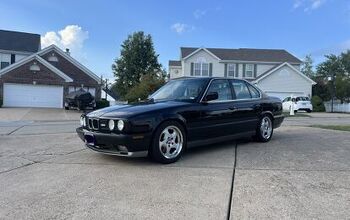Question Of The Day: Have We Passed The Peak Of Cheap?
The good old days of late summer 2009.
It was a great time to buy a new car. Monthly new car sales in North America had plummeted to under 10 million units. Access to financing seemed to be near impossible for a lot of consumers. Brands were orphaned. Leasing collapsed. Banks were picky. The future was uncertain and… raw materials were cheap.
It was a good time to buy new at a deep, deep discount. Has that time passed?
What got me thinking about this was a late model car I was using for my auction travels. A popular car. One that sells like hotcakes. Yet it looks like nearly every interior component within it has been parts binned, deconteted and cheaped out to epic proportions.
It offered good fuel economy, a nice radio display, and several hundred pounds of plastics that were in varying forms. Could the car get any cheaper and remain marketable?
I had my doubts. From the wafer fin door panels. To the glossy, Tonka like display of the center dashboard. It reeked of cheap to the point where an hour inside of it felt like a petrochemical bath.
As I went to that evening sale, I thought, “I wonder if this material is cheaper to buy than cardboard boxes?” It was an honest question because everybody uses this cheap stuff. From the mightiest of manufacturers to the most irrelevant of niche players. The hollowness of material quality and feel for anything 20k or under seems to be an epidemic of cheap these days.
Yet everything costs more. Reconsider those MSRP’s for a moment. There was a time not to long ago when a $13,000 Yaris, Versa, Cobalt, Aveo, Rio, and PT Cruiser were publicized on a paperish pulp we used to know as a newspaper. Remember those?
Now a few of these names, along with their far more marketable descendants are venturing hard towards the $20,000 mark. There a few discounts. Maybe even a rebate or two. But the hard march to the next big round number seems to be the new tune of 2012. A loaded Camry can now retail for well over $30k. The Lexus LS400h can now cost nearly $100k. We’re talking two decent foreclosed houses in the ex-urbs here folks!
This brings the TTAC readers to our question for today. Have we passed the peak of cheap? Are we bound to a new world of car buying where commuter cars only feel cheap and the ‘nip and tuck’ of cost containment has run the course?
What says you?
More by Steven Lang
Latest Car Reviews
Read moreLatest Product Reviews
Read moreRecent Comments
- Jalop1991 is this anything like a cheap high end German car?
- HotRod Not me personally, but yes - lower prices will dramatically increase the EV's appeal.
- Slavuta "the price isn’t terrible by current EV standards, starting at $47,200"Not terrible for a new Toyota model. But for a Vietnamese no-name, this is terrible.
- Slavuta This is catch22 for me. I would take RAV4 for the powertrain alone. And I wouldn't take it for the same thing. Engines have history of issues and transmission shifts like glass. So, the advantage over hard-working 1.5 is lost.My answer is simple - CX5. This is Japan built, excellent car which has only one shortage - the trunk space.
- Slavuta "Toyota engineers have told us that they intentionally build their powertrains with longevity in mind"Engine is exactly the area where Toyota 4cyl engines had big issues even recently. There was no longevity of any kind. They didn't break, they just consumed so much oil that it was like fueling gasoline and feeding oil every time


































Comments
Join the conversation
Yes. We have significant inflation and it takes more dollars each cycle to buy the next car. Car manufacturers have been trying to simultaneously squeeze cost out of cars while increasing the list of standard accessories. Went too far in the cost reduction and now prices have to rise to buy decent quality interior plastic and parts that last longer than just the warranty period. We've become like Bowerbirds, using borrowed money to buy big shiny stuff to impress. It used to be possible to impress other people with luxury features. Now Hyundai checks the boxes for features that used to be only available from luxury brands. Consumers have reacted by putting more emphasis on brand, making BMW, Audi, and Mercedes the entry level for making a luxury impression. A house needs 20ft high ceilings at the front entrance. Takes something exotic like Ferrari or Bentley plus an exclusive zip code to break through the borrowed money entry level luxury clutter. Really sucks to be Lincoln right now, neither cheap nor luxury.
Sorry, but this kind of statistic means sh*t. It's very easy to offer an explaination, like "more trucks are being sold and trucks are more expensive than cars." A better way of doing it would be to concentrate only one segment and one model. Like for Toyota, use only Camry LE's transaction price for the entire span of one model cycle.